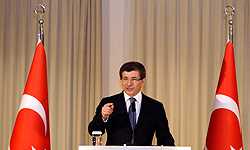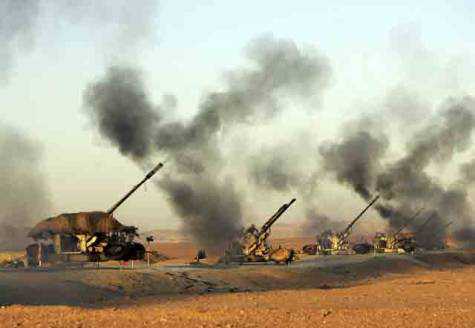ISTANBUL (Hurriyet Daily News)–Iran and six world powers ended talks Tuesday with an agreement to hold their next round of nuclear negotiations in Istanbul early next year.

“We and Iran agreed to a continuation of these talks in late January in Istanbul, where we plan to discuss practical ideas and ways of cooperating toward resolution of our core concerns about the nuclear issue,” European Union foreign-policy chief Catherine Ashton said in a statement after two days of talks in Geneva on Iran’s nuclear program.
Following the Geneva meetings, Ashton called Turkish Foreign Minister Ahmet Davutoglu on Tuesday to inform him about the decision to hold the next rounds of talks in Istanbul.
The talks in Geneva were positive, Ashton told Davutoglu, according to Foreign Ministry spokesman Selcuk Unal. “Davutoglu welcomed the decision to hold the next talks in Turkey and conveyed his gratification about hosting the meeting,” Unal told the Hurriyet Daily News & Economic Review on Tuesday. “He said Turkey would continue to contribute to global and regional peace.”
According to Unal, the Iranians had told Ankara on more than one occasion that they would feel more comfortable meeting in Turkey. The spokesman also noted that Ashton had called Davutoglu just prior to the Geneva talks and thanked the minister for Turkey’s contribution to restarting the discussion with Iran.
Ashton had previously rejected Tehran’s preference for a meeting in Istanbul, where Iran would have Turkish allies on the sidelines. Asked if Turkey would participate in the January talks, Unal said no involvement on the part of Ankara has yet been planned.
Following the two days of talks in Geneva between Iran and six major powers – the United States, Russia, China, Britain, France and Germany – Ashton said in a statement that they were ready to address and seek common ground with Iran.
“We have had nearly two days of detailed substantive talks, focusing on the Iranian nuclear program and the need for Iran to comply with its international obligations. The countries I represent are united in seeking a resolution of the international community’s concerns regarding Iran’s nuclear program, which is the central purpose of these talks,” Ashton said. “We recognize Iran’s rights but insist it fulfill its obligations. We are ready to address and seek common ground also on other issues of mutual interest.”
Saed Jalili, Iran’s chief nuclear negotiator, confirmed the timing and venue of the planned talks, while saying his country would not waver from its insistence that it has a right to enrich uranium for peaceful purposes.
“We reject the idea of talks under pressure,” he told reporters. Avoiding any mention of nuclear issues, Jalili would only say the talks will be “on the issue of cooperation” between Tehran and the six world powers.
In Iran, President Mahmoud Ahmadinejad said lifting the sanctions imposed by the United Nations and others would help achieve progress in the talks.
“If you come to talks with sincerity, loyalty to the law, friendship and respect for the definite rights of the Iranian nation, and then cancel the wrong mistakes you made – which didn’t have any impact on the Iranian nation – and cancel resolutions, sanctions and some restrictions that you imposed, it will definitely be helpful,” state TV’s website quoted Ahmadinejad as saying.
Talks between Iran and the six world powers went to a recess Monday with no sign that Tehran was ready to discuss the U.N. Security Council’s demands that it curb nuclear activities that could be harnessed to make weapons, an official at the negotiations told the Associated Press. “About 75 percent” of Monday’s three-hour morning session was devoted to nuclear issues, the official said.
That raised some hope because the Islamic republic had come to the table insisting that the negotiations address Iran’s nuclear program only peripherally – if at all.
Although the afternoon plenary was also mostly taken up with nuclear issues, the official said it was dominated by Jalili’s complaints about past wrongs committed by the West against his country in the nuclear field, in statements reaching back in history to 1953.
That clearly fell short of hopes from the six other countries that Iran would at least address the Security Council demands as a start to discussions on enrichment and related issues. “Obviously we have not made progress on the substance,” said the official.
Tehran says it does not want atomic weapons and insists its nuclear program is only designed to provide more power for its growing population. But it is under four sets of U.N. Security Council sanctions for refusing to freeze enrichment of uranium, which can be used to make fuel for reactors as well as fissile warhead material.
Last year’s talks in Vienna resulted in announcements that Iran had agreed to give up much of its enriched uranium in exchange for fuel for a medical-research reactor. However the deal fell apart and no further meetings were held for the last 14 months.
Iran said in November that any nuclear fuel swap with the major powers must be based on an agreement it signed with Brazil and Turkey in May.
Turkey and Brazil brokered a fuel-swap deal with Tehran that would have seen Iran ship much of its low-enriched uranium to Turkey in return for nuclear fuel rods needed for a medical research reactor. Western nations rejected the deal and backed a fourth round of U.N. sanctions against Iran on June 9.
via Next Round of Iran Nuclear Talks Set for Istanbul | Asbarez Armenian News.





